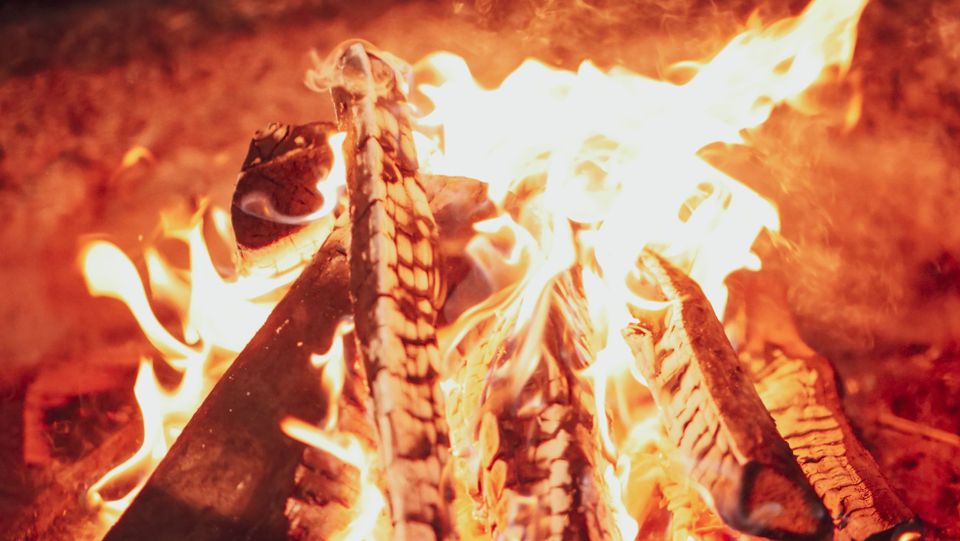Fire

How was the fire discovered? Fire was discovered in an unknown way. Humans used it every day to cook and get heat and light. In a normal day of life, our ancestors developed the skill of using fire. They used it in all kinds of arts and to communicate. Finally, fire is common everywhere in the world.
Imagine, two young boys had arrived at a great huge cave in Kenya, Africa in the evening. After the sun had set, the surroundings were extremely dark. To mention, both of them had not thought of bringing a lamp with them. So, there was nothing to light up. As the two of them were in thought, lightning occurred with fire. How lucky were the two boys? The lucky time had arrived for them. One of the boys rushed to get the fire. From where? Yes from the only tree nearby. And the two boys played and slept in the light and the warmth of the fire. The weird thought is, is this how the fire was discovered?
The discovery of fire might have come from a lightning storm. There is no direct evidence of the discovery of fire. Research by archaeologists shows that fire was discovered in the Stone Age. It was found in information from investigations by archaeologists that fire was not a part of human behaviour, until around three hundred thousand years back. Terrence Twomey believes that there was no domestic fire in between four hundred thousand years and eight thousand years. Homoerectus was found to be the first to invent the control of fire. And that was in the Stone Age. The earliest proof of fire used by humans was found in sites of Oldowan hominids in the Lake Turkana of Kenya, Africa. Well, the first evidence recorded outside Africa was in Israel. And it is the Lower Paleolithic site of Gesher Benot Ya'aqov. Also, more than a thousand years back, the earliest hearth was found in Waseem cave of Israel. These findings show how humans were skilled and able to cook. However, these hearths cannot confirm the ability to create a fire. If fire did not exist then our whole species might not exist.
It is a nice fact that controlling fire is a skill to develop. Fire and language are the two elements humans bring with them to wherever they go. There need to be three components to light up a fire. They are fuel to burn, oxygen to keep it going and heat for it to begin. This is known as the fire triangle, and to prevent a fire from lighting up, reduce at least one component from the fire triangle.
Fire was one of the greatest innovations of our ancestors. If fire wasn’t discovered by the early ancestors, how would we be living? It allows us to do a lot of things. For instance, it allows us to produce light and heat, cook plants and animals, clearing forests for planting, heat-treating stones for making stone tools and keeping predatory animals away. All the same, fire helped humans to invent some new types of arts. They are pottery and statues. The discovery of fire allowed humans to become more socialized and civilized. And they started to gather around fire creating campsites. Fire gave humans access to larger settlements and cultural achievements.
When going through the history of Maldivians we could find that our ancestors had used fire for different and unique practices. For example, with the help of it, they communicated with the other islanders over long distances. If huge incidents have happened they would light up a fire near the shore to inform other islands. This evidence shows that early Maldivians used fire too.
To conclude, if we think of fire, it is one of the most important forces on earth. Imagine what would happen to humans if fire was not discovered. After finding fire, both of the boys decided to publish a book. “FIRE!”
References
The Discovery of Fire in the Early Stone Age (thoughtco.com)
When Did We Discover Fire? Here's What Experts Actually Know | Time
Control of fire by early humans - Wikipedia
Author biography
Fathimath Hishma Hafeez, born in 2007, is a creative teenager. She is from Addu City, Maldives. Currently, she is enrolled in a prestigious learning programme called “Leaders of Tomorrow” by Professor Ugail. Her hobbies are writing, reading and painting. And she has a special interest in sports. Her top favourite sports are swimming, badminton and netball. Her dream is to become an author and an interior designer.


Cite this article as:
Fathimath Hishma Hafeez, Fire, theCircle Composition, Volume 1, (2021). https://thecirclecomposition.org/fire/
